
PHILOSOPHY OF THE SUZUKI METHOD
Japanese violinist, Shinichi Suzuki, created the Suzuki Method to teach young children to play the violin.
Below are some of the elements of his philosophy that were integral to developing the Mother Tongue approach to teaching children the violin.
-
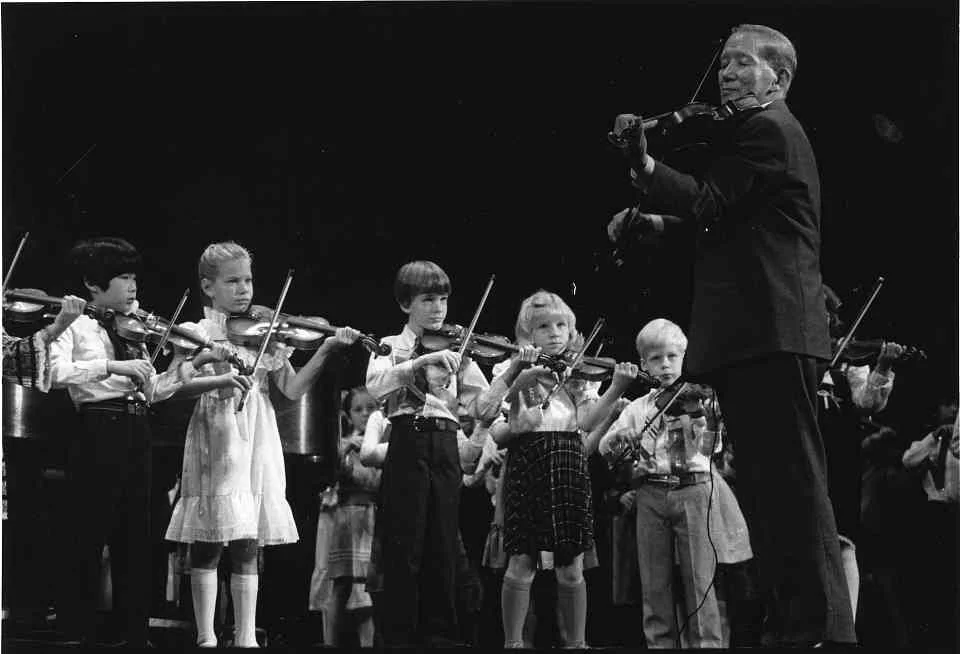
Philsophy
“I just want to make good citizens. If a child hears good music from the day of his birth, and learns to play it himself, he develops sensitivity, discipline and endurance. He gets a beautiful heart.” Shinichi Suzuki
Shinichi Suzuki believed that every child has the opportunity to become a fine human being through a rich musical experience. He believed that when children played beautiful music that they were pouring forth their beautiful spirits in the rich and beautiful sound of their instruments.
-
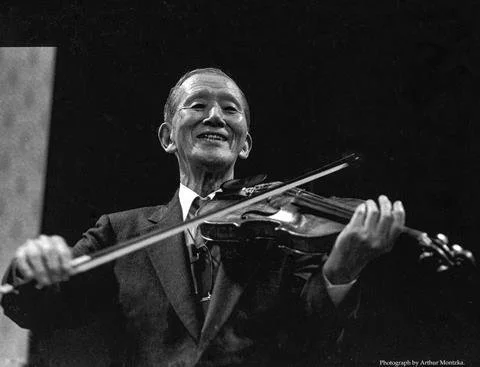
Mother Tongue Method
Suzuki had the epiphany that he based his philosophy on: “Any and every Japanese child all speak Japanese without difficulty. Does that not show a startling talent?” Shinichi Suzuki
Suzuki had an epiphany that every child could speak in their mother tongue without any formal education. They learned to do so through consistently listening to those around them talking, especially their parents. He then applied this principle while teaching young children to play the violin in the similar way they learn to speak their language. Suzuki also noted that children learned to speak before they could read. Therefore, continuing with this philosophy reading music is delayed when learning violin through the Suzuki method.
-
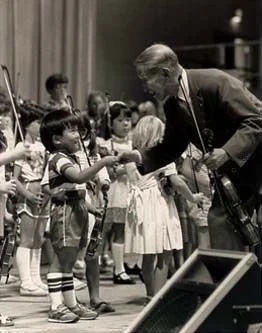
Every Child Can
"All children possess the potentiality of being trained to superior abilities." Shinichi Suzuki
Suzuki’s philosophy was that all humans are born with high potential for self development. He believed that skill doesn’t just come by nature without training, but rather it is developed by the environment through education and repetition.
-
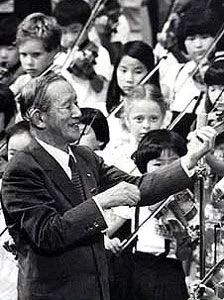
Environment
“A person is the product of his environment.” Shinichi Suzuki
Suzuki believed that superior abilities were developed in a superior environment. He also understood that what doesn’t exist in the environment will not develop in the child. He emphasised consistent listening to the Suzuki recordings, daily practice and the parent and teacher creating a nurturing and encouraging environment.
-
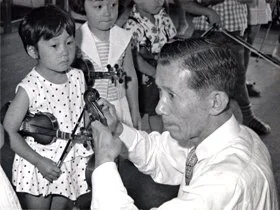
Early Start
“I think that we should remember that the child is getting education from the time it is born. In Talent Education, we warn all parents that education cannot be started too soon. Our motto is: the sooner, the better.” Shinichi Suzuki
Suzuki believed in the benefit of beginning Talent Education from an early age. While a child may begin formal violin training at the age of three, on the other hand listening to recordings of the repertoire are encouraged to begin much earlier.
-

Parental Involvement
“My heartfelt belief is that the fate of a child is in the hands of his parents.”
“Children learn to smile from their parents.” Shinichi Suzuki
In Japan parents of children learning violin through the Suzuki method are encouraged to attend the lessons with their children. This is of great importance as children receive only one lesson a week, therefore the parent must understand how to support the child’s learning during the other six days. The role of the parent is of guidance and encouragement.
-

Listening
“The young child’s rate of progress is directly dependent upon the amount of listening he does.” Shinichi Suzuki
One significant principle of the Suzuki Method is the emphasis of consistent listening to the Suzuki recordings to create an environment so the child learns in the same manner as they acquired their mother tongue. This listening is of great benefit to students learning new repertoire.
-

Memorisation
“Memory is essential; and depending on training, one's ability to memorise gets better and better, and the time it takes to memorise gets shorter and shorter. And after one has learned something, one does not forget it. Memory skill can be acquired by anybody if it is properly inculcated.” Shinichi Suzuki
Suzuki stated that “Suzuki students must learn to play music by heart, and it becomes a habit with them. A student who is trained by this method from the first and is developed in his memory ability can learn a new piece very quickly.” Another reason why playing by memory is important is because it also frees the child's attention so that they may concentrate on other aspects of playing such as posture, technique, and pitch.
-

Review and Repetition
“Knowledge is not skill. Knowledge plus ten thousand times is skill.” Shinichi Suzuki
Review and repetition are fundamental elements of the Suzuki Method philosophy. This is also based on the mother tongue approach to learning as when children learn to speak, they retain the first words spoken and keep them in their vocabulary to use over and over, while they also learn new and more complicated words. If a student consistently plays their review pieces they then have a solid foundation and the necessary skills to learn a new piece more easily and quickly.
-
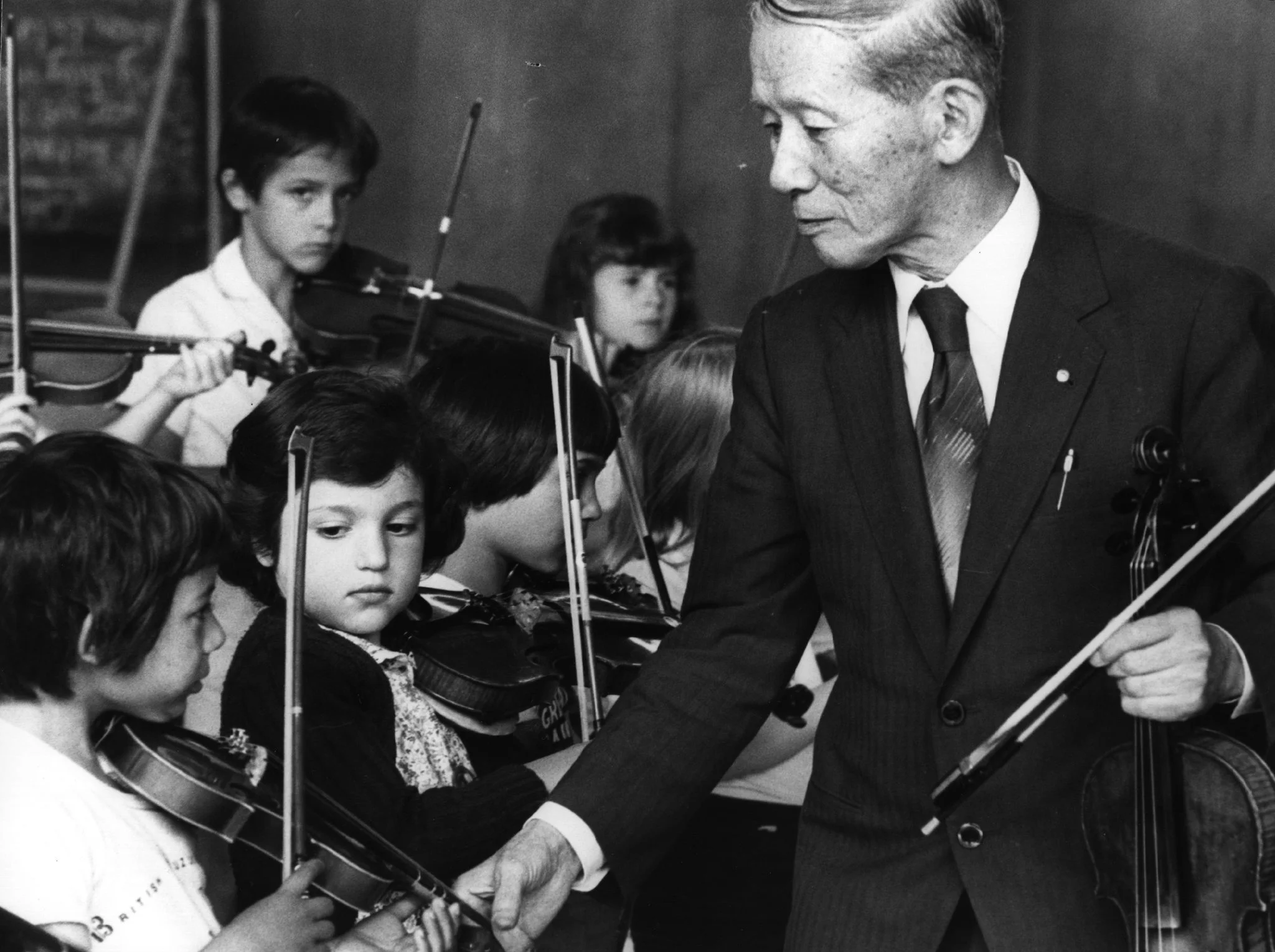
Tone and Tonalization
“Tone has a living soul.” Shinichi Suzuki
Creating a beautiful and resonant tone was an obsession of Suzuki. He believed that creating a beautiful tone created a beautiful heart. Suzuki called the practice of developing a beautiful tone “Tonalization,” and encouraged including Tonalization in every lesson and practice.
-
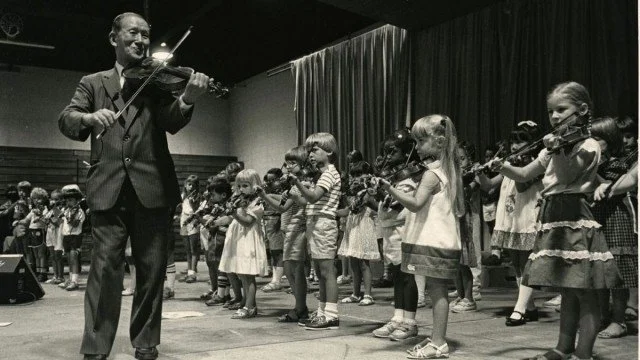
Group Lessons
“Once a month at least, all the children in the class are called together, and they joyfully play together the pieces they have learned up to now. Through the group lessons they can effectively study musical beat, correct posture, beautiful tone, poise, etc. These occasions are extremely effective, especially for small children, because they can play and learn with advanced students.” Shinichi Suzuki
An integral part of the Suzuki method are group lessons, as they can significantly contribute to the motivation and development of students. Violinists are able play with their peers as well as more advanced students, and to hear performances of the pieces they will later learn to play. In group lessons students have the opportunity to refine their skills and increase their confidence while playing alongside their peers.
-

Love of Music
“The final objective of Talent Education is to cultivate artistic appreciation in a child, not to make a musician out of every child we teach. It is a movement started by myself and carried on by parents who want to bring up their children to have a refined human character.” Shinichi Suzuki
In summary, music brings together many people from many walks of life. Suzuki has created a legacy for the world in the belief of potential greatness of each small child, and the joy of nurturing this development. It is this celebration of the infinite potential of children and the joy of playing that draws people of all nations to the Suzuki Method and Suzuki’s philosophy.
